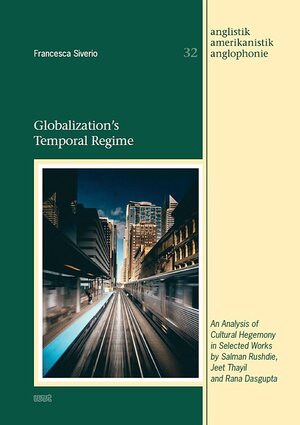Globalization’s Temporal Regime
An Analysis of Cultural Hegemony in Selected Works by Salman Rushdie, Jeet Thayil and Rana Dasgupta
von Francesca SiverioGlobalization characterizes the contemporary era. Considered as a recent manifestation of Western hegemony and identified with the undisputed power of the United States, globalization replaces European colonialism in determining the current power relations. The literary analyses of Fury (2001) and The Golden House (2017) by Salman Rushdie, Narcopolis (2012) and The Book of Chocolate Saints (2017) by Jeet Thayil and Tokyo Cancelled (2005) by Rana Dasgupta explore how globalization-as-modernity has radicalized the role of temporality in determining one’s cultural belonging and how it uses a specific conceptualization of time to pursue its cultural agenda. What are the features of globalization’s temporality? What kind of values and individuals are promoted by globalization’s temporal hegemony? What role do one’s biography, creativity and the social body play in the formulation of alternative temporal and cultural configurations? The fictional texts not only show how the perpetuation of Western cultural hegemony is strictly intertwined with the imposition of a specific temporal regime, but they also shed light on the importance of alternative narratives and, ultimately, on the liberating power of imagination.
TABLE OF CONTENTS
1. Introduction 1
1.1 Genesis and Aims of Study 1
1.2 Main Questions 4
1.3 Thesis 6
1.4 Methodological Approach and Corpus 7
1.5 Chapter Survey 9
2. Theoretical Framework 11
2.1 Introduction: From Colonialism to Globalization 11
2.2 Colonial Narrative: ‘The Great Derangement’ 12
2.3 Globalization 22
2.4 Towards a Reconceptualization of Globalization 33
3. Furious Ecstasy. A Reading of Salman Rushdie’s Fury 38
3.1 Introduction 38
3.2 An Epochal Shift 39
3.3 (Un)Making of the American Myth 42
3.4 Past: Erasure and Subversion 46
3.5 Present: Ecstatic Fury 50
3.6 Conclusions 54
4. Neoliberalism and Other Drugs 56
4.1 Introduction 56
4.2 Neoliberal Vocabulary 56
4.3 Opium 57
4.4 Heroin 63
4.5 Cocaine, MDMA and Ecstasy 67
4.6 History and Dystopian Present 71
4.7 Sites of Transgression 75
4.8 Conclusions 81
5. Nero Golden Who? Story of a Downfall. The Golden House 83
5.1 Introduction 83
5.2 Nero Golden, Jay Gatsby and Trimalchio 85
5.3 Opulence 86
5.4 Nero’s Shadowy Past 90
5.5 Downfall 94
5.6 Subversion 98
5.7 Conclusions 104
6. Unstable Temporality and Storytelling. A Reading of Tokyo Cancelled 106
6.1 Introduction 106
6.2 ‘The Memory Editor’ and ‘The Billionaire’s Sleep’ 107
6.3 ‘The Changeling’ and Frame Narrative 123
6.4 Genre and Transgression 134
6.5 Conclusions 137
7. Shaping Alternative Narratives. Jeet Thayil’s The Book of Chocolate Saints 139
7.1 Introduction 139
7.2 Critique of Modernity 140
7.3 Narrative Power 144
7.4 Subversion 151
7.5 Conclusions 159
8. Conclusion 161
8.1 Introduction 161
8.2 The Radicalization of Temporality 161
8.3 Globalization’s Temporal Regime 162
8.4 Globalization and Culture 165
8.5 Sites of Transgression 168
8.6 Globalization 2.0 172
8.7 Further Research 173
9. Summary 175
10. Bibliography and Works Cited 179
10.1 Primary Sources 179
10.2 Secondary Sources179







